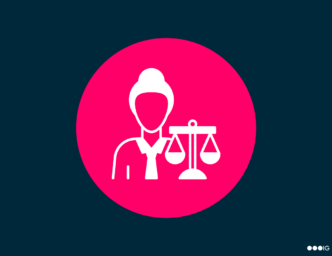In the competitive legal landscape, law firms and in-house teams that invest in top-notch litigation support reap the rewards in the long run. But determining the support you need and locating skilled professionals can be challenging.
Here’s a quick, expert-approved overview of the six essential litigation support services and roles every law firm needs!
RELATED: When to Hire a Paralegal vs. a Lawyer for Your Law Firm
Top Litigation Support Roles and Services
1. Litigation Paralegal
Litigation paralegals play a crucial role in aiding attorneys throughout the litigation process, especially in trial preparation.
Qualifications typically include an undergraduate degree or an ABA-approved paralegal certificate. Individuals pursuing a law degree can also serve as litigation support specialists.
The most competitive candidates have an undergraduate bachelor’s degree in a related field combined with specialized certification as a trial/litigation paralegal.
Aside from assisting attorneys during trials, litigation support services specialists also:
- Gather case-related information
- Handle and organize electronic data, documents, and evidence
- Ensure accuracy, completeness, and compliance with legal standards
- Facilitate the use of technology in the courtroom
2. Paralegal
Paralegals help with new and ongoing law firm cases, working in support of attorneys and their clients. Some paralegal duties extend to billing, client intake, and overarching client service. Still, case management is the primary focus of the typical paralegal’s responsibilities.
Paralegals do the following and more:
- Organize case information
- Communicate with clients and update them on case progress
- File documents with courts
- Manage the law firm’s calendar
- Provide additional support as necessary
Despite not practicing law, paralegals have substantial knowledge of legal procedures, regulations, and terminology, enabling attorneys to navigate cases seamlessly. The most reliable paralegals conduct thorough legal research, examining case rulings for precedents, statutes, case laws, and regulations.
Experienced paralegals are trusted with drafting legal documents. They commonly assist lawyers in creating, editing, and submitting legal documents like motions, pleadings, briefs, and contracts.
Some paralegals hold an ABA-approved paralegal certificate or an undergraduate degree in paralegal studies or a related field. Others possess an unrelated bachelor’s degree or, at times, no degree whatsoever.
The crucial factors are experience in a related role and possessing the appropriate training and soft skills.
3. Legal Assistant
Legal assistants work in a capacity similar to that of a paralegal. These professionals provide underlying administrative support for attorneys. Legal secretaries perform client intake, draft and prepare documents, draft correspondence, and file documents with courts.
The duties of the position extend to:
- Managing attorney schedules
- Scheduling appointments
- Setting up meetings
- Communicating with relevant parties
- Perform legal research
Typically, the most qualified candidates for legal assistant positions have professional certifications like Accredited Legal Professional (ALP) or Professional Legal Secretary (PLS). Some firms do not require candidates to hold a college degree or certificate if they have relevant experience.
4. Trial Consultant
Trial consulting is a litigation support service that helps lawyers and legal teams prepare for trials. They provide various services to help attorneys present their cases in court. These professionals may offer expertise in areas like jury selection, case strategy, witness preparation, mock trials, jury research, and developing persuasive courtroom presentations.
Most trial consultants have one or multiple areas of expertise, like graphology (the study of handwriting), law enforcement, and psychology. The primary purpose of the trial consultant is to lend advice and assistance in preparation for a case headed to trial.
At a minimum, trial consultants have an undergraduate degree in a relevant field, but many of them have a graduate degree in their field. Some trial consultants previously or currently work as attorneys.
5. Forensic Accountant
Forensic accountants assist attorneys and law enforcement in solving crimes that require forensic analysis. They conduct financial audits of businesses and investigate fraud.
Forensic accountants’ assessment of financial information related to evidence tied to crimes is central to the success of ensuing litigation. These experts also help attorneys and law enforcement understand the subtleties of financial reports, prepare testimonies for court, and identify wrongdoing.
The educational qualifications to work as a forensic accountant are extensive. Aspiring forensics specialists are advised to earn an undergraduate accounting degree. Moreover, achieving a passing score on the Certified Public Accountant (CPA) exam also paves a path toward working in this field.
The most coveted candidates obtain relevant forensic accounting certifications like Certified Forensic Accountant (CFA) and Certified in Financial Forensics (CFF).
6. eDiscovery Specialist
eDiscovery has emerged as a relatively new employment niche within the legal space, but the field has fully rounded out as the legal discovery process shifted online. In short, eDiscovery specialists manage the electronic aspect of discovery.
You might consider hiring a team of eDiscovery specialists if you anticipate a legal case that involves large amounts of electronic data. They excel at managing, organizing, and analyzing electronic information pertinent to your case, ultimately saving attorneys hundreds of hours of valuable time in the long run.”
Some eDiscovery professionals have college degrees in relevant fields like information technology or library science. Others have law-related degrees or certificates.
Some of the most qualified candidates for eDiscovery positions have industry-relevant certifications within the eDiscovery field:
- Certified Information Systems Security Professional (CISSP)
- Certified eDiscovery Specialist (CEDS)
- Relativity Certified Administrator (RCA)
eDiscovery specialists prepare discovery documents for filing. These professionals retrieve discovery documents and regularly interact with courts and opposing counsel. eDiscovery specialists assess ESI, an acronym short for electronically stored information. They also develop policies for ESI preservation and ensure ongoing ESI compliance.
If you have
READ NEXT: Can ChatGPT Help When Hiring Legal Talent?
Benefits of Litigation Support for Law Firms and In-House Counsel Teams
Legal support staff do administrative and other work that is essential for attorney success. From managing client relations to preparing legal documents and interacting with court personnel, these professionals’ contributions are key in keeping law firms and in-house counsel teams up and running at full speed.
Need to Hire Temporary or Permanent Legal Support?
Fill out the form below, and our team will contact you in as little as 10 minutes! Questions? Call us toll-free: 855-485-8853


 by Anna Morelock
by Anna Morelock




 by Brita Long
by Brita Long 
 by Patrick Glynn
by Patrick Glynn